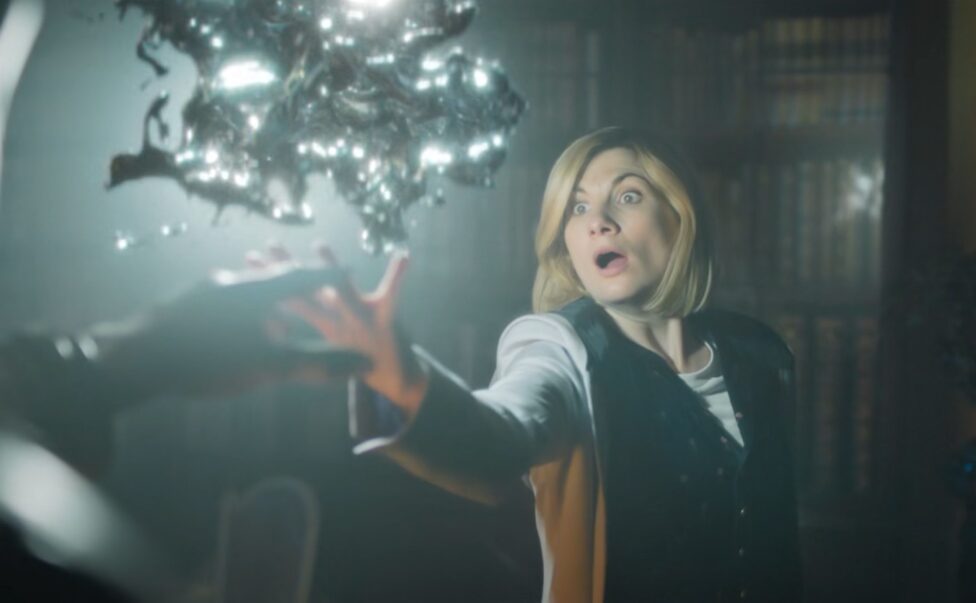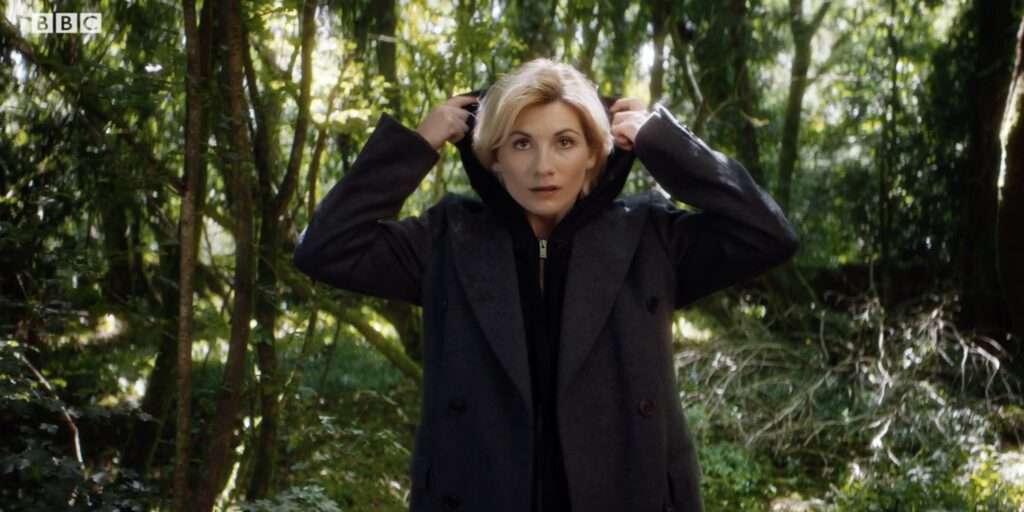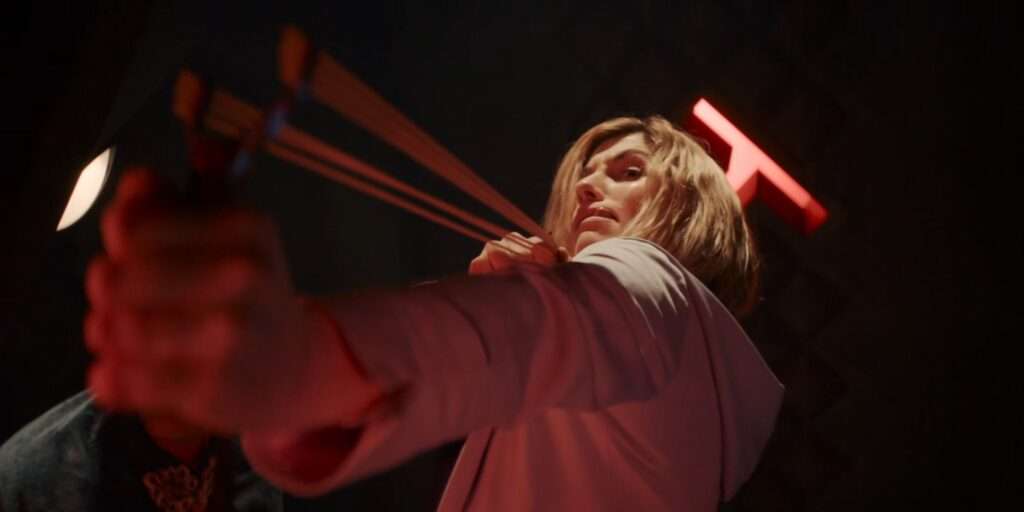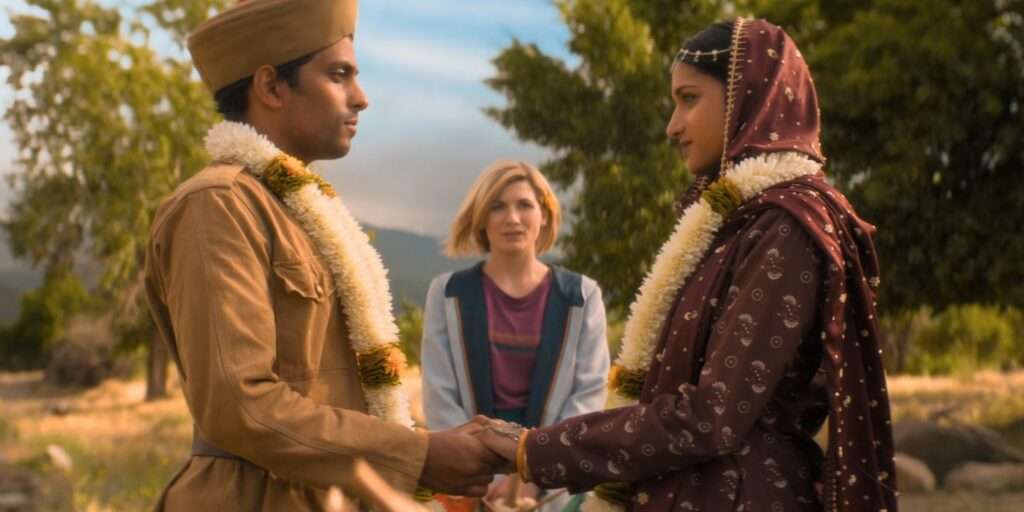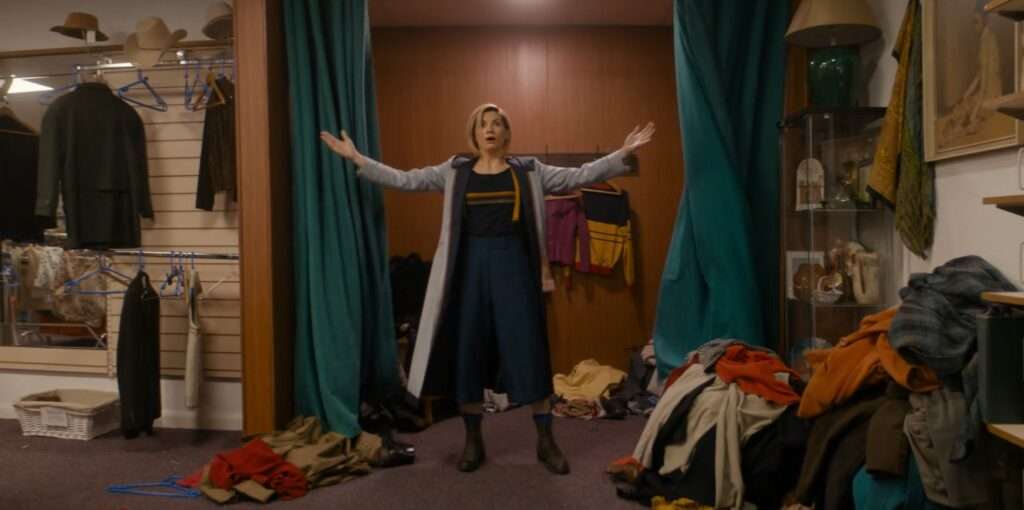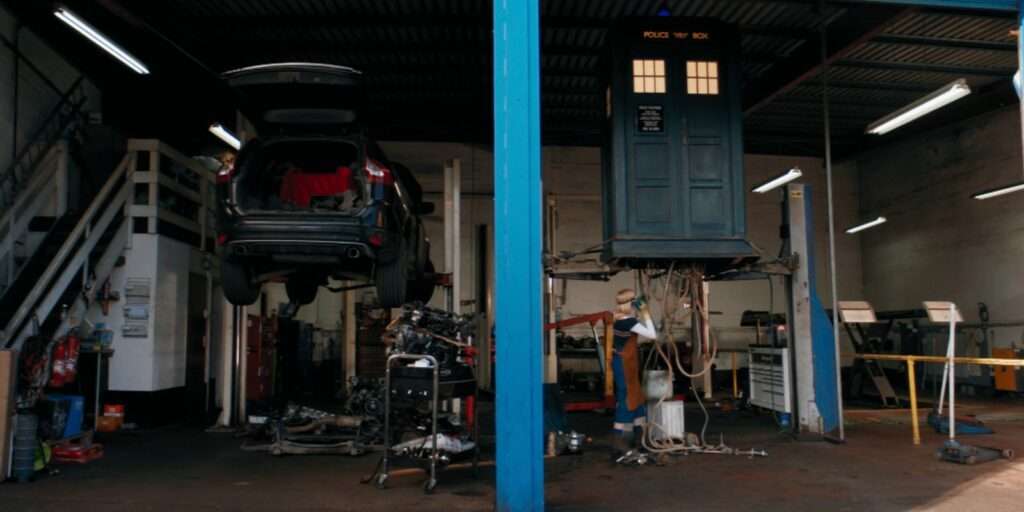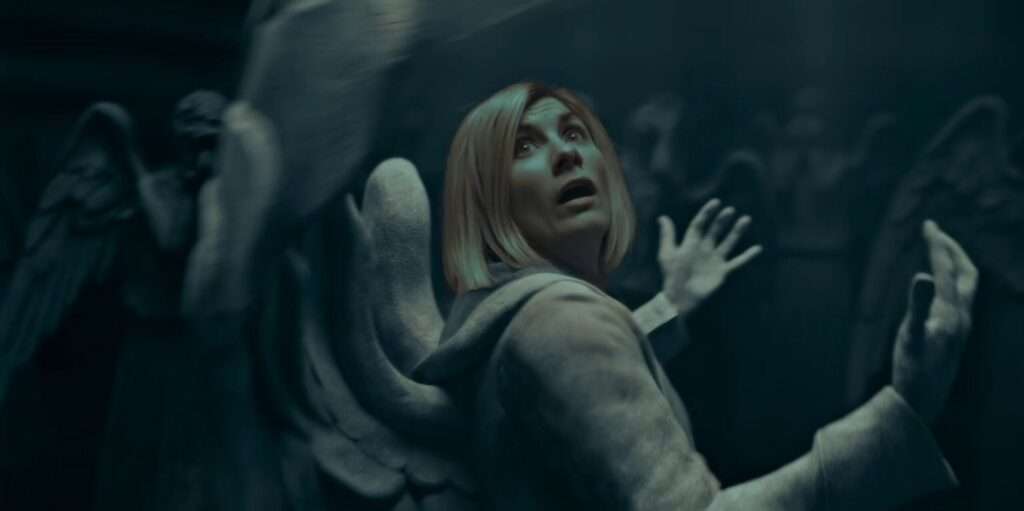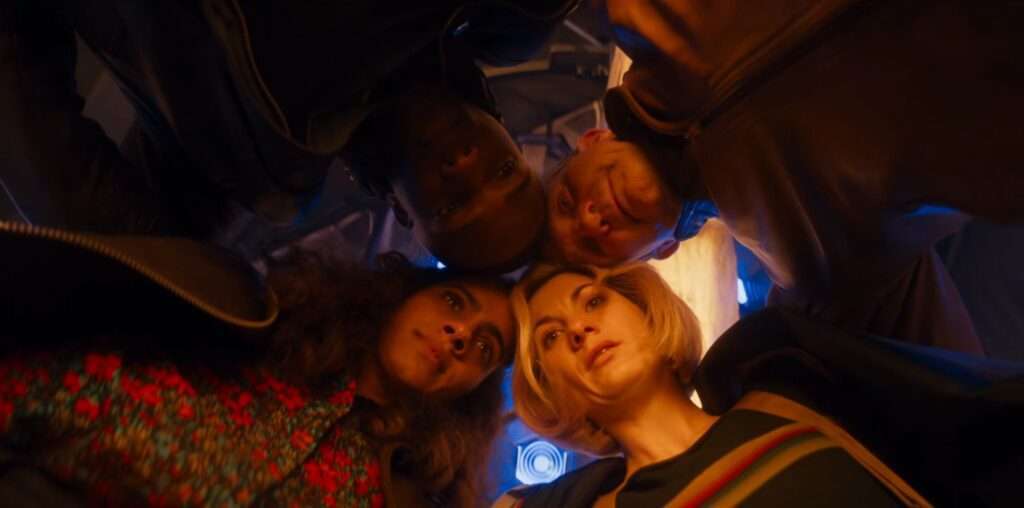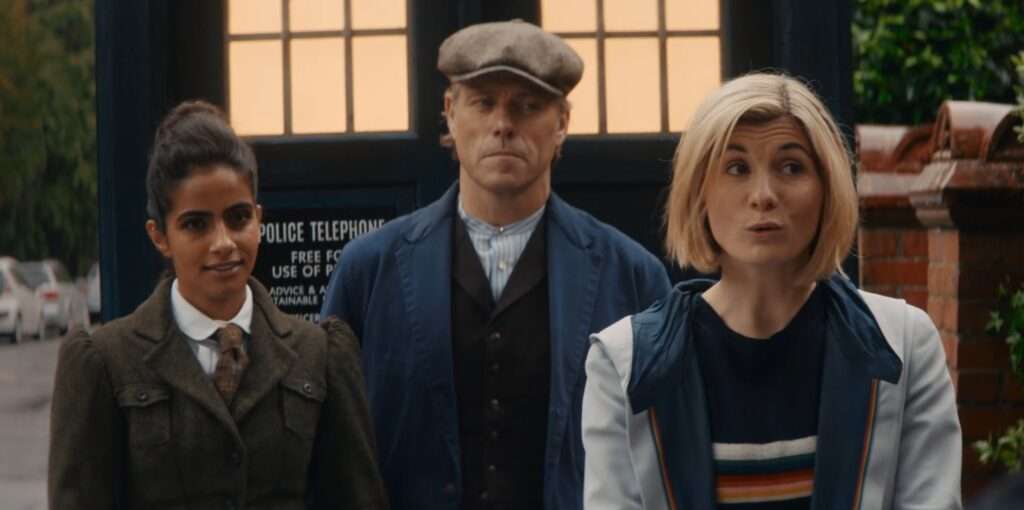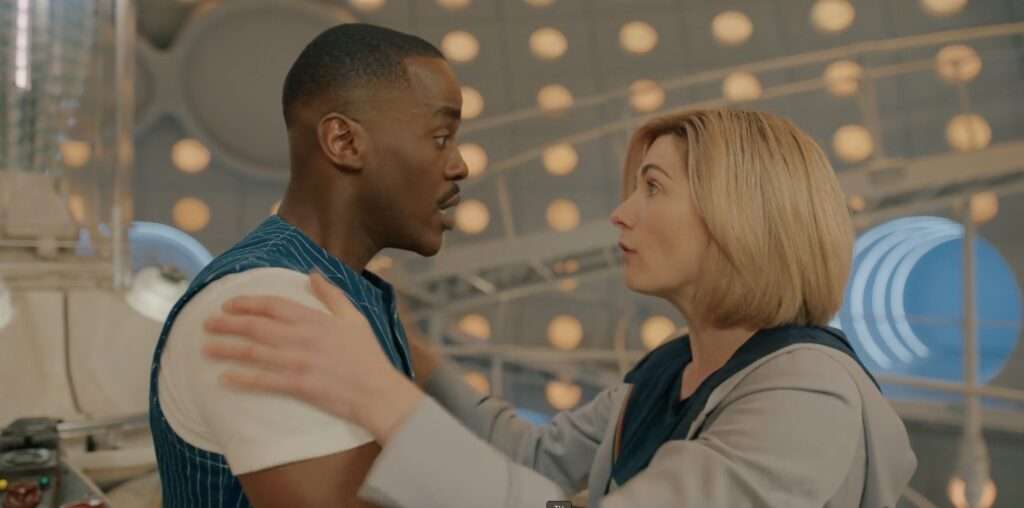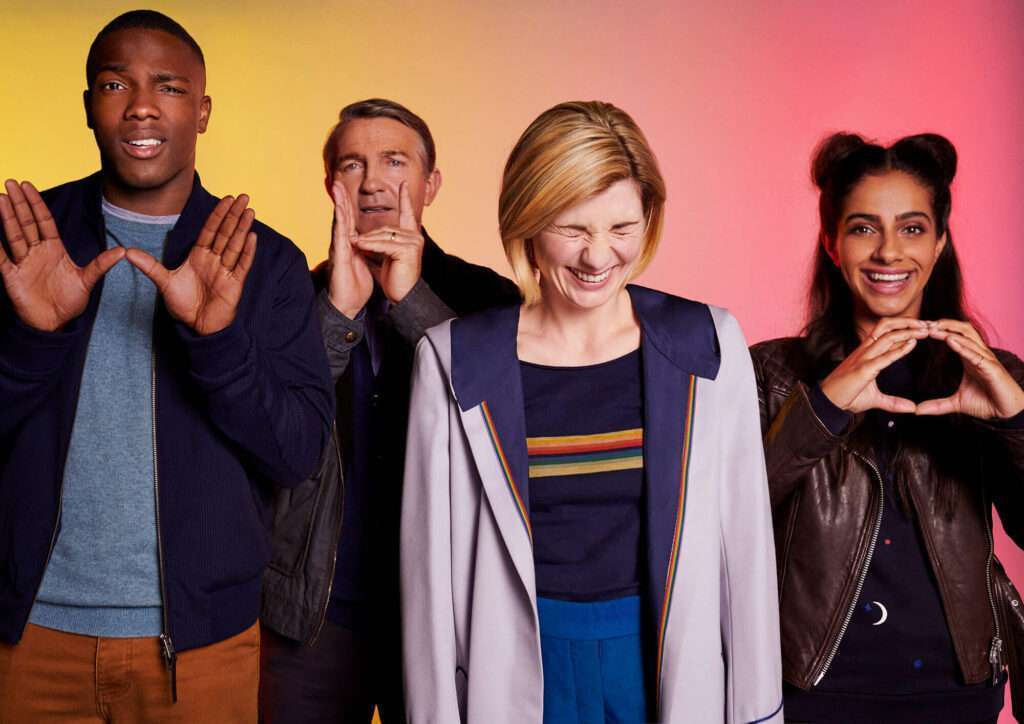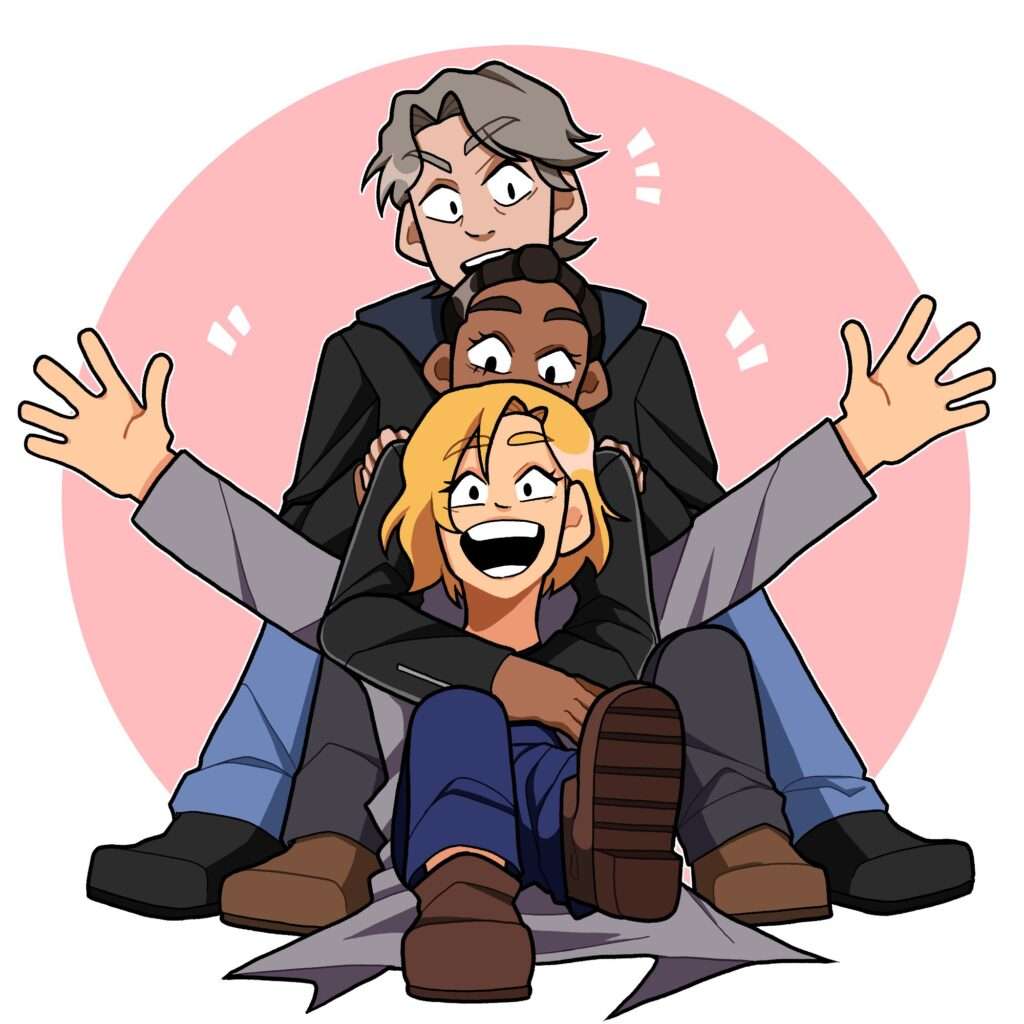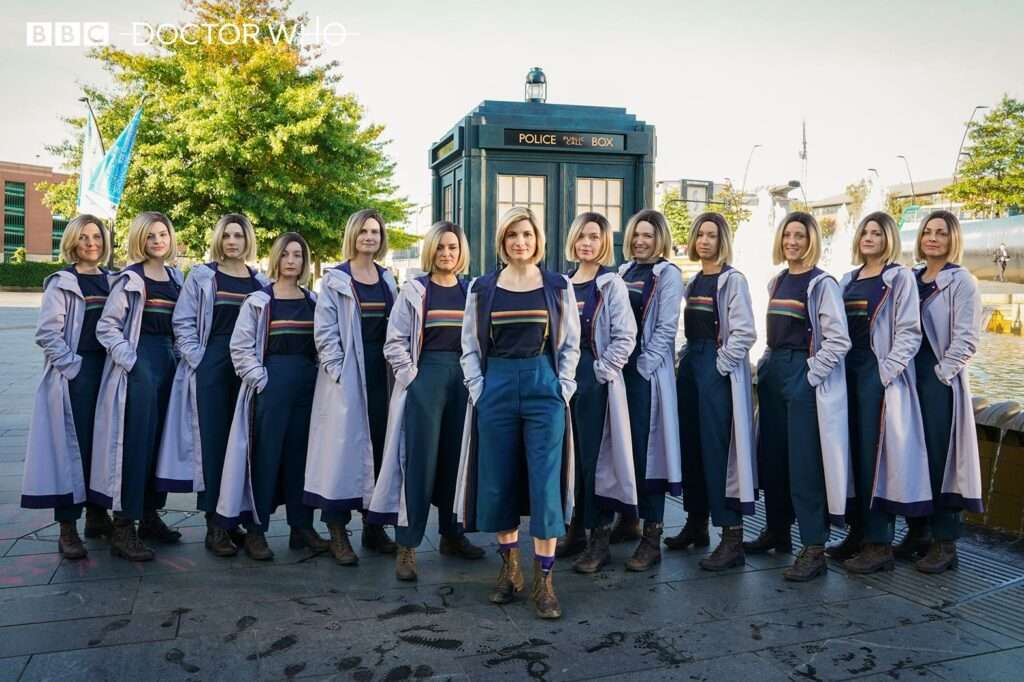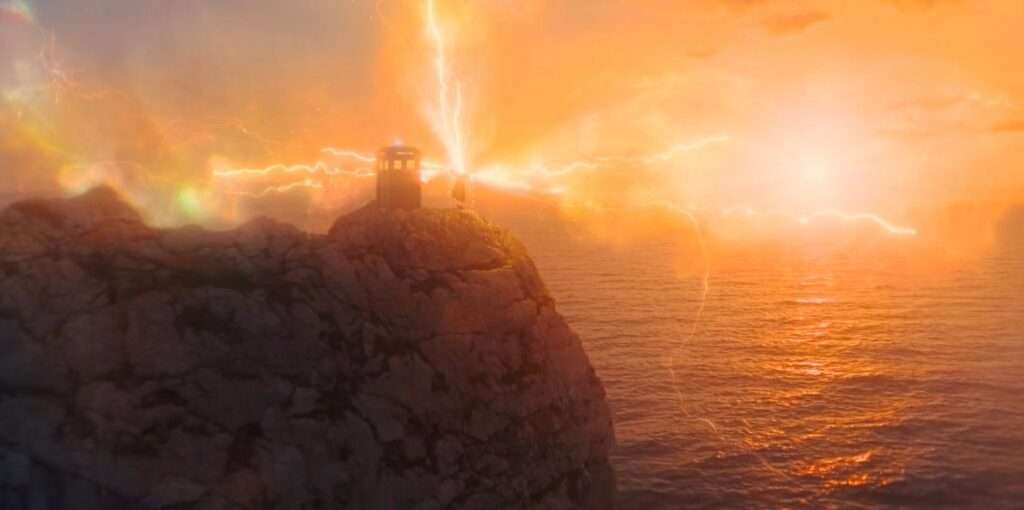Who Marathon: Jodie Whittaker
I have to admit up front something that’s considered a bad thing in fandom – but stick with me. I was totally against the Doctor being female. I never cared for the idea. Not because the character was a woman per se, but more to the point that they changed the gender. The character had to this point been male (for 55 years), so the change was something I felt to be unnecessary. On the day they announced Jodie publicly, I made the statement that if the Doctor had been female since 1963, and they made the character male, I’d feel the same way. At that point, I had considered the show “over”, and I wasn’t going to watch it anymore. I really REALLY didn’t want that to happen.
Now when she was cast, I was aware of her as an actress prior to this (mostly with David Tennant in Broadchurch), but I never actually saw anything she was in, so she was pretty much an unknown to me. This is pretty common – for the most part, Doctor actors are total blank slates to me. But I was still against the gender change. I read interviews, I watched the press leading up to her first episode. I softened a bit on the “the show is over” stance, but I still was going to “hate watch” it – I probably could never truly quit Doctor Who, I like it too much, but I still was against the gender change.
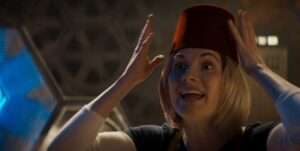 Her episodes finally premiered. I did like the stance they said before the first series that there wouldn’t be any recurring Doctor Who characters (Daleks, Cybermen, Master) to try and give the new incarnation some room to breathe, to get her own identity of sorts without being run over by the show’s tropes. I liked that idea, actually. However, in execution, it felt as we went through the first series that the character was disconnected from the show’s past canon. In watching her first series, I felt nothing that made me feel this was the same character played by William Hartnell, Jon Pertwee, Colin Baker, David Tennant, etc… I know the show can rely on its own legacy and characters too much at times, but the total absence of it in the first series I don’t think helped. Once they brought that stuff into the second series, I think the show felt more real to me, and when we got to the third series (Flux) and its specials, it felt right again. I actually ended up really liking Jodie Whittaker’s Doctor (even if the writing was naff in places). When it was announced she was leaving, I have to say I really felt disappointed – as I wanted more of her Doctor, I had gotten used to it. Quite a turnaround from the way I felt when she started when I didn’t want anything to do with it. Have to admit my initial rage was misplaced, but I still stand by the gender change bit – I wish they hadn’t done it, but since they did, I ended up enjoying it anyway. There was one thing that I can say I consistently didn’t like about her performance. It was how she used the sonic screwdriver. She waved it around like a maniac, like none of the others did. That always bugged me – but is a minor quibble, I admit.
Her episodes finally premiered. I did like the stance they said before the first series that there wouldn’t be any recurring Doctor Who characters (Daleks, Cybermen, Master) to try and give the new incarnation some room to breathe, to get her own identity of sorts without being run over by the show’s tropes. I liked that idea, actually. However, in execution, it felt as we went through the first series that the character was disconnected from the show’s past canon. In watching her first series, I felt nothing that made me feel this was the same character played by William Hartnell, Jon Pertwee, Colin Baker, David Tennant, etc… I know the show can rely on its own legacy and characters too much at times, but the total absence of it in the first series I don’t think helped. Once they brought that stuff into the second series, I think the show felt more real to me, and when we got to the third series (Flux) and its specials, it felt right again. I actually ended up really liking Jodie Whittaker’s Doctor (even if the writing was naff in places). When it was announced she was leaving, I have to say I really felt disappointed – as I wanted more of her Doctor, I had gotten used to it. Quite a turnaround from the way I felt when she started when I didn’t want anything to do with it. Have to admit my initial rage was misplaced, but I still stand by the gender change bit – I wish they hadn’t done it, but since they did, I ended up enjoying it anyway. There was one thing that I can say I consistently didn’t like about her performance. It was how she used the sonic screwdriver. She waved it around like a maniac, like none of the others did. That always bugged me – but is a minor quibble, I admit.
OK, now she’s in the role, and I was watching it, what did I think? Well, her first series was all over the place. First off as I said, her first series went out of its way to not use any of the old tropes (Cybermen, Daleks, etc). This made for a disjointed feel to the series. Some of the episodes were outstanding. Some were bad, and a couple were downright awful. I mean in some regard, that’s been how Doctor Who has always been through the years. No series is perfect. But her first series had more of an uneven feel to me because of the aforementioned choice to break from the established backstory stuff and do something new for the new Doctor.
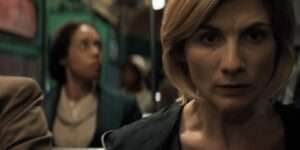 That’s not to say there weren’t great moments. There were. The two highlights of the series overall were the “Rosa” & “Demons of the Punjab” episodes. The first one took on the Rosa Parks historical event in a way that I thought worked perfectly. They didn’t shy away from the inherent racism of that story and its events – it was on display (Ryan getting assaulted by a white man). They even had our characters on the fabled bus with Rosa, which one would think on the surface would be corny, but this was not. I adored the way they integrated the “fam” into the story, even going so far as to show Graham’s discomfort at being there (verbally). It wasn’t all sad/negative – there was some fun stuff, too – the bit with Ryan making coffee for Rosa Parks & Dr. Martin Luther King Jr was hilarious. The episode also broke convention and didn’t have the traditional closing theme of Doctor Who. They used a real life song – “Rise Up” by Andra Day, which I thought worked perfectly. Despite having a weak sci-fi villain in the story, this was a 10/10 for me. Adored Rosa. Top notch Doctor Who.
That’s not to say there weren’t great moments. There were. The two highlights of the series overall were the “Rosa” & “Demons of the Punjab” episodes. The first one took on the Rosa Parks historical event in a way that I thought worked perfectly. They didn’t shy away from the inherent racism of that story and its events – it was on display (Ryan getting assaulted by a white man). They even had our characters on the fabled bus with Rosa, which one would think on the surface would be corny, but this was not. I adored the way they integrated the “fam” into the story, even going so far as to show Graham’s discomfort at being there (verbally). It wasn’t all sad/negative – there was some fun stuff, too – the bit with Ryan making coffee for Rosa Parks & Dr. Martin Luther King Jr was hilarious. The episode also broke convention and didn’t have the traditional closing theme of Doctor Who. They used a real life song – “Rise Up” by Andra Day, which I thought worked perfectly. Despite having a weak sci-fi villain in the story, this was a 10/10 for me. Adored Rosa. Top notch Doctor Who.
Punjab was also excellent. It dealt with end up in the middle of a real life event in 1947 – “The Partition of India” – it was a regional/cultural conflict between India & Pakistan. This too had racism in it – but not as overt as Rosa. It dived into a strength the BBC has always had – period pieces. This looked AMAZING, the plot worked, the sci-fi elements were mixed in well, and didn’t feel wedged into the story. As I said when I wrote about this one, it has “a lot of feels”. It also got time travel into it, as Yaz met her own Grandmother as a young woman. Was an excellent episode.
These two are exhibit A when I see people complain that Whittaker’s era has nothing good in it. Bullshit. These two are excellent Doctor Who. I also enjoyed other episodes too – “Kerblam!” was just silly and fun, and had probably the only reference to another era of Doctor Who that I could think of – Jodie’s Doctor briefly wears a fez, harkening back to Matt Smith’s 11th Doctor. It Takes You Away was a good story as well. The problem is there’s a lot of “meh/bad” episodes, culminating in the season finale, which his the WORST finale in all of modern Doctor Who. Even the guy who wrote it said they filmed the first draft as he was too busy to finish it.
Things got better in the second series when we brought back some old things (The Master, Daleks, Cybermen, Capt Jack, Gallifrey), it felt more like the show we knew at that point. The Master and the Cybermen got some great new updates. It wasn’t all better, there was some naff stuff in her second series. But having watched all her episodes again recently in the marathon, I have to say that this stuff was better than I remembered. Not perfect, not all top shelf stuff, but overall, more enjoyable than I recalled. In fact, writing this I was so taken in thinking about the Rosa episode that I had to put the end segment with the bus on again, and it got me again. Then there’s Haunting of Villa Diodati. An amazing episode that does everything right. An all time banger of an episode. Adored that.
I think part of the show’s problem in this time is that Chibnall took some wild swings with the stories. One was in the middle of Jodie’s second series. It was the “Fugitive of the Judoon” episode. They introduced a before unknown incarnation of the Doctor. Ncuti Gatwa will get credit for being the first actor of color as the Doctor, but it really was Jo Martin here. The reveal came out of nowhere and was a big time surprise. What’s more it was done in a way that you don’t know where this Doctor fits. 13 doesn’t remember her, and she doesn’t remember 13, so neither can figure out where the Doctor fits in the timeline. Some fans speculated that she was in-between Troughton & Pertwee (similar to the way the War Doctor was between 8 & 9. Other postulated that she was a pre-Hartnell Doctor. That turned out to be fairly likely, as it brings me to the next bullet point.
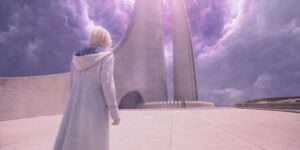 The Timeless Children. This was an episode that changed the established canon in a way that hadn’t been done for decades. A lot of fans revolted over the idea here that it made William Hartnell canonically not the first Doctor – and by a lot. The idea here was that as a child, The Doctor was found by someone who brought them to Gallifrey, where the child’s ability to regenerate was studied and brought into Gallifreyan life, forming what we know as Time Lord society. That the Doctor has had an untold number of regenerations in the past. The Doctor worked for something called “Division” (something the old show called the “Celestial Intervention Agency”). Eventually the Doctor had their mind wiped, and regenerated into the William Hartnell Doctor and started the timeline we know now. Fans REVOLTED against this idea, it was reviled for the most part. I didn’t care for the changes in canon myself, but I didn’t think it was an awful idea, as there was ways to fit established canon into this. But I get why people were upset. It wasn’t totally forgotten about, as it’s come up in the 60th Anniversary specials with the 14th Doctor by David Tennant. So it won’t be forgotten about, but I would be surprised if a ton of attention is paid to this. Kind of the way the “Half human on my mother’s side” thing from the 8th Doctor TV movie is ignored.
The Timeless Children. This was an episode that changed the established canon in a way that hadn’t been done for decades. A lot of fans revolted over the idea here that it made William Hartnell canonically not the first Doctor – and by a lot. The idea here was that as a child, The Doctor was found by someone who brought them to Gallifrey, where the child’s ability to regenerate was studied and brought into Gallifreyan life, forming what we know as Time Lord society. That the Doctor has had an untold number of regenerations in the past. The Doctor worked for something called “Division” (something the old show called the “Celestial Intervention Agency”). Eventually the Doctor had their mind wiped, and regenerated into the William Hartnell Doctor and started the timeline we know now. Fans REVOLTED against this idea, it was reviled for the most part. I didn’t care for the changes in canon myself, but I didn’t think it was an awful idea, as there was ways to fit established canon into this. But I get why people were upset. It wasn’t totally forgotten about, as it’s come up in the 60th Anniversary specials with the 14th Doctor by David Tennant. So it won’t be forgotten about, but I would be surprised if a ton of attention is paid to this. Kind of the way the “Half human on my mother’s side” thing from the 8th Doctor TV movie is ignored.
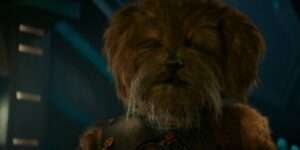 Her third series Flux is a bit of a disjointed mess. However, I’ll cut them some slack as it was produced during the worst times of the covid-19 pandemic. That we got ANY Doctor Who at all during this time was something to behold. The series was just 6 episodes long, and they did Trial of a Time-Lord again, by having the entire series be a single connected story. Two of the episodes were great (War of the Sontarans & Village of the Angels), but the rest of it was mostly meh, although not BAD as such. Jodie’s series finished out with a couple of specials (two good, one not good), and her entire era ended in a totally fun fan service episode (The Power of the Doctor) which was cameo-palooza. It was a fun episode, but as my wife said at the time – “That episode was made for fans like you, not me”. It did have some brilliant moments – the returns of Tegan & Ace in actual meaty roles. We also got 5 & Tegan meeting and talking, and most importantly 7 & Ace having a chat, bringing a resolution to their character arcs which we never got due to the cancellation of the classic series after 1989. It also brought back William Russell as Ian Chesterton. He didn’t say much, as in real life he has dementia, but he was there, got to speak, and it was brilliant. I audibly gasped out loud when I saw him the first time.
Her third series Flux is a bit of a disjointed mess. However, I’ll cut them some slack as it was produced during the worst times of the covid-19 pandemic. That we got ANY Doctor Who at all during this time was something to behold. The series was just 6 episodes long, and they did Trial of a Time-Lord again, by having the entire series be a single connected story. Two of the episodes were great (War of the Sontarans & Village of the Angels), but the rest of it was mostly meh, although not BAD as such. Jodie’s series finished out with a couple of specials (two good, one not good), and her entire era ended in a totally fun fan service episode (The Power of the Doctor) which was cameo-palooza. It was a fun episode, but as my wife said at the time – “That episode was made for fans like you, not me”. It did have some brilliant moments – the returns of Tegan & Ace in actual meaty roles. We also got 5 & Tegan meeting and talking, and most importantly 7 & Ace having a chat, bringing a resolution to their character arcs which we never got due to the cancellation of the classic series after 1989. It also brought back William Russell as Ian Chesterton. He didn’t say much, as in real life he has dementia, but he was there, got to speak, and it was brilliant. I audibly gasped out loud when I saw him the first time.
 No matter what you think of the stories or the acting, Doctor Who has NEVER looked as good as this. There was some behind the scenes format change – new cameras, new directors, new art people, a combination, but the show never looked as good as this. I first thought this when there was a scene in “The Ghost Monument” where there was a boat on a lake. It simply looked amazing. Doctor Who has never looked this good.
No matter what you think of the stories or the acting, Doctor Who has NEVER looked as good as this. There was some behind the scenes format change – new cameras, new directors, new art people, a combination, but the show never looked as good as this. I first thought this when there was a scene in “The Ghost Monument” where there was a boat on a lake. It simply looked amazing. Doctor Who has never looked this good.
In the end, I completely turned around on Whittaker’s era. I started off wanting to hate it, but ended up wishing she wasn’t leaving, as I thought she got better as time went on. I suspect Jodie will be an easy get when it’s time for the inevitable multi-Doctor stories in the future. They always happen. Would LOVE to see actual physical meetings between 13 and other incarnations on screen (and I mean not the kind we got in Power either).
One thing that Whittaker’s era did better than any other in the modern show in my opinion is the theme song. Segun Akinola’s take on the old theme tune is by far my favorite of the revived era (this includes what’s come after her with Tennant 2 & Gatwa). In fact, it’s my favorite since the Peter Howell 1980 version for Tom Baker’s last series of the show. I utterly ADORE Whittaker’s theme tune from the first moment I heard it. More than any of Murray Gold’s variants, or the couple of different versions in the classic era’s end years. This is a brilliant tune.
The reason I like it so much is that it harkens back to the king of the themes – the original 1963 variant. But it does something modern with it. It sounds more like a derivative of the original theme than ANY other modern variant (including the version for Tennant’s 60th anniversary specials). I just can’t get enough of it – it’s by far my single favorite thing of the entire Whittaker era. It’s not just the music either – the visuals going on remind me of a CGI derivative of the original howl around effect used from Day through the end of Pertwee’s fourth series.
Here, check it out for yourself…
The BBC also did this video a few years ago where they put ALL the title sequences and theme songs together in a single video, which I’ve watched many times. Check that out, too.
As I’ve done in the other sections, here’s a few words about the companions Jodie’s Thirteenth Doctor traveled with. But before I get to that, here’s some numbers on her series.
- Number of series: 3 (plus specials)
- Number of stories: 24
- Number of episodes: 31
- Number of companions: 4
Jodie’s era probably could have used a fourth series, as her number of episodes is quite low. That’s because they reduced the number of episodes per series again when she started to 10 per series (from Capaldi’s 12, and Eccleston/Tennant’s 13). Then for Flux it went even lower (but again covid was to blame there).
Jodie’s companion list is pretty steady, not a lot of changes – her two full series had the same roster, and the third series & specials, had one new one. They are:
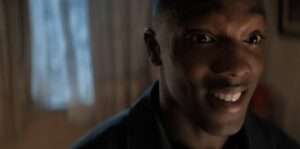 Ryan Sinclair (Tosin Cole) – The first character seen ever in Jodie’s era – the first second of the first episode starts with Ryan (discounting trailers). His character was one that got the littlest character development, IMO. There were some issues with his father that were explored early on, but we dealt with fairly early on. Once we got past the “daddy issues”, Ryan never did a whole lot. He was said to have “dyspraxia” (a coordination imbalance), but it never came up as a plot point beyond once or twice – and always around riding a bicycle. It never played into how he interacted with anyone, so like Mel Bush’s “computer programmer” in her bio, we never found this as part of their regular story arc. His best moment I think was in the Rosa episode when he had an awesome reaction to being in the same room with Rosa Parks & Martin Luther King Jr. He’s the step grandson of Graham (more on him later) whose mother died canonically right before the show started. He was friends with Yaz when they were in school. I don’t blame Tosin – he seemed like a nice enough guy, but they never did anything with his character of significance. He left at the end of Revolution of the Daleks, and never returned. He was supposed to return for a cameo in Jodie’s last story, but scheduling prevented that fro happening as far as I can tell.
Ryan Sinclair (Tosin Cole) – The first character seen ever in Jodie’s era – the first second of the first episode starts with Ryan (discounting trailers). His character was one that got the littlest character development, IMO. There were some issues with his father that were explored early on, but we dealt with fairly early on. Once we got past the “daddy issues”, Ryan never did a whole lot. He was said to have “dyspraxia” (a coordination imbalance), but it never came up as a plot point beyond once or twice – and always around riding a bicycle. It never played into how he interacted with anyone, so like Mel Bush’s “computer programmer” in her bio, we never found this as part of their regular story arc. His best moment I think was in the Rosa episode when he had an awesome reaction to being in the same room with Rosa Parks & Martin Luther King Jr. He’s the step grandson of Graham (more on him later) whose mother died canonically right before the show started. He was friends with Yaz when they were in school. I don’t blame Tosin – he seemed like a nice enough guy, but they never did anything with his character of significance. He left at the end of Revolution of the Daleks, and never returned. He was supposed to return for a cameo in Jodie’s last story, but scheduling prevented that fro happening as far as I can tell.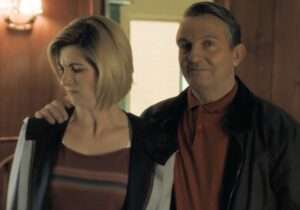 Graham O’Brien (Bradley Walsh) – I have to admit when this cast was first announced, I really wanted Bradley Walsh to be the Doctor. Even after the series started, I still felt that way – I just love what Walsh did with the role. He already was kind of like a Doctor character with what he did. He married the grandmother of Ryan, and was his step-grandfather. A lot of the early episodes had lines with Graham trying to endear himself to Ryan. It eventually worked, as towards the end of their time on the show, they had become closer, which was a nice development. Also early in the show’s story it was said that Graham was a cancer survivor, which was the reason he married Grace, as she was his nurse. However, aside from a few comments, that part of his character was forgotten about. However, the one thing I thought was handled quite well was the death of his wife Grace. She died saving the rest off them in Whittaker’s first episode, and she would pop up from time to time as some sort of memory for Graham. I thought Graham’s anguish at losing his wife was handled well. Overall, a super nice character that I loved seeing. He left the series with Ryan at the end of Jodie’s second series. He did make an appearance in Whittaker’s finale, both in the “companion support group” at the end of ep, but also before that with Ace. Great stuff.
Graham O’Brien (Bradley Walsh) – I have to admit when this cast was first announced, I really wanted Bradley Walsh to be the Doctor. Even after the series started, I still felt that way – I just love what Walsh did with the role. He already was kind of like a Doctor character with what he did. He married the grandmother of Ryan, and was his step-grandfather. A lot of the early episodes had lines with Graham trying to endear himself to Ryan. It eventually worked, as towards the end of their time on the show, they had become closer, which was a nice development. Also early in the show’s story it was said that Graham was a cancer survivor, which was the reason he married Grace, as she was his nurse. However, aside from a few comments, that part of his character was forgotten about. However, the one thing I thought was handled quite well was the death of his wife Grace. She died saving the rest off them in Whittaker’s first episode, and she would pop up from time to time as some sort of memory for Graham. I thought Graham’s anguish at losing his wife was handled well. Overall, a super nice character that I loved seeing. He left the series with Ryan at the end of Jodie’s second series. He did make an appearance in Whittaker’s finale, both in the “companion support group” at the end of ep, but also before that with Ace. Great stuff.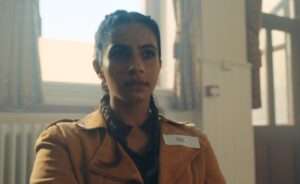 Yazmin “Yaz” Khan (Mandip Gill) – I remember in Jodie’s first series, I had Yaz filed as the “nothing” character, that we got no character development. To some extent that feeling was wrong – when I rewatched the episodes, there was more there than I realized. But Yaz didn’t really come into her own until there were less Tardis occupants. In this fast moving format of modern Who, there isn’t a ton of time to spend on characters, and when there’s four Tardis occupants, someone’s going to get pushed out. That was Yaz early on for me. But once it was just Yaz (and later Dan), she got more to do. The two actresses played the characters as having some affection even if never exploited on screen – this was referred to as “Thasmin“. The production team eventually picked up on it, and there were some big hints towards the two having a romantic thing, but it was never explicitly stated on screen. Not fully, but very much hinted at (with things like this from Flux ep 1). Yaz was definitely the best friend of 13, and saved her in Jodie’s last episode. There was definite friendship, leaning towards other stuff, but it was never fully followed up on. In the end, the character worked for me, but took some time to get there.
Yazmin “Yaz” Khan (Mandip Gill) – I remember in Jodie’s first series, I had Yaz filed as the “nothing” character, that we got no character development. To some extent that feeling was wrong – when I rewatched the episodes, there was more there than I realized. But Yaz didn’t really come into her own until there were less Tardis occupants. In this fast moving format of modern Who, there isn’t a ton of time to spend on characters, and when there’s four Tardis occupants, someone’s going to get pushed out. That was Yaz early on for me. But once it was just Yaz (and later Dan), she got more to do. The two actresses played the characters as having some affection even if never exploited on screen – this was referred to as “Thasmin“. The production team eventually picked up on it, and there were some big hints towards the two having a romantic thing, but it was never explicitly stated on screen. Not fully, but very much hinted at (with things like this from Flux ep 1). Yaz was definitely the best friend of 13, and saved her in Jodie’s last episode. There was definite friendship, leaning towards other stuff, but it was never fully followed up on. In the end, the character worked for me, but took some time to get there.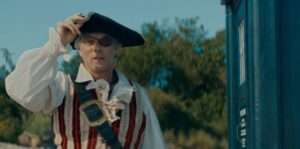 Dan Lewis (John Bishop) – Going into Jodie’s third series (and specials), they weren’t going with just one companion (Yaz), so a new one was needed. That’s Dan Lewis, played by comedian John Bishop. There was a quick trailer introducing him after Revolution of the Daleks. He was in all six Flux episodes, and the three specials that followed, but his appearance in “The Power of the Doctor” was minimal, as he left the Tardis after the first scene, so Power was just the Doctor & Yaz. He was billed as a kind soul, as he worked at a food bank, didn’t have any money himself, a generally personable character. I rather liked him – he worked well with Karvanista in Flux. Somewhat playing to his real life, the character was fairly funny – he whacked Sontarans on the back of the nick with a wok. He was also observant, and the person who first voiced the Thasmin thoughts out loud. He was a nice character, loyal, one I enjoyed. Wish we had him earlier than we did in Whittaker’s era. I wouldn’t mind seeing him come back again, although it probably would never happen.
Dan Lewis (John Bishop) – Going into Jodie’s third series (and specials), they weren’t going with just one companion (Yaz), so a new one was needed. That’s Dan Lewis, played by comedian John Bishop. There was a quick trailer introducing him after Revolution of the Daleks. He was in all six Flux episodes, and the three specials that followed, but his appearance in “The Power of the Doctor” was minimal, as he left the Tardis after the first scene, so Power was just the Doctor & Yaz. He was billed as a kind soul, as he worked at a food bank, didn’t have any money himself, a generally personable character. I rather liked him – he worked well with Karvanista in Flux. Somewhat playing to his real life, the character was fairly funny – he whacked Sontarans on the back of the nick with a wok. He was also observant, and the person who first voiced the Thasmin thoughts out loud. He was a nice character, loyal, one I enjoyed. Wish we had him earlier than we did in Whittaker’s era. I wouldn’t mind seeing him come back again, although it probably would never happen.
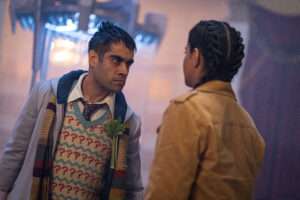 I probably should also mention Sascha Dawan as the Master. There’s no explanation as to where he is in the timeline, if he’s after Missy, or before or what. The actor did an amazing job with the Master playing unhinged. The way he ended his time on the show, he was blown up, but as well all know that never stops the Master from coming back. In Whittaker’s finale, he forced the Doctor to regenerate into him temporarily, so we got Dawan as the Doctor who wore a weird outfit which was a mish-mash of several Doctor’s outfits – heck he even played Troughton’s flute (and a song Troughton played too!)
I probably should also mention Sascha Dawan as the Master. There’s no explanation as to where he is in the timeline, if he’s after Missy, or before or what. The actor did an amazing job with the Master playing unhinged. The way he ended his time on the show, he was blown up, but as well all know that never stops the Master from coming back. In Whittaker’s finale, he forced the Doctor to regenerate into him temporarily, so we got Dawan as the Doctor who wore a weird outfit which was a mish-mash of several Doctor’s outfits – heck he even played Troughton’s flute (and a song Troughton played too!)
This is the part in these reviews where I talk about how the actor has come back to the role. That’s not a thing, as Jodie has only been gone a year (ish) as I write this, so there haven’t been any opportunities for her to return. However, she’s said in interviews she’d love to do it if asked, so unlike her predecessor, we should expect to see her again at some point in the future. The 13th Doctor has been mentioned a few times in passing in the episodes that have come since. In the first of the 60th specials, 14 mentions having just been a woman, and it was also mentioned that “an hour ago I was a brilliant woman” in the Destination Skaro short. On top of that, repercussions from Flux (and the Timeless Children stuff) were mentioned in detail in the 2nd special, too, so the ramifications of Jodie’s era won’t be forgotten, which is good.
UPDATE Jun 2025: Jodie did return. In Ncuti Gatwa’s final episode, Jodie returned in a cameo right before Gatwa himself regenerated. It was super nice to see both of them in a in proper multi Doctor moment. It didn’t last super long – only a few minutes, but it was very enjoyable. Plus Jodie got to say “Timey wimey” which she never did in her own era, and she got to carry long a long standing tradition of insulting the Tardis interior of a future regeneration (to them). Her appearance in that scene was totally unnecessary, but also really enjoyable and fun – glad to see it.
As I said before, when Jodie was cast, I was against the idea. But I got over that, and ended up enjoying her era, and wasn’t ready for her to go when she did. Would have liked more.
… next up – David Tennant returns as the 14th Doctor for the three 60th anniversary specials, and then a new era is upon us in 2024.


